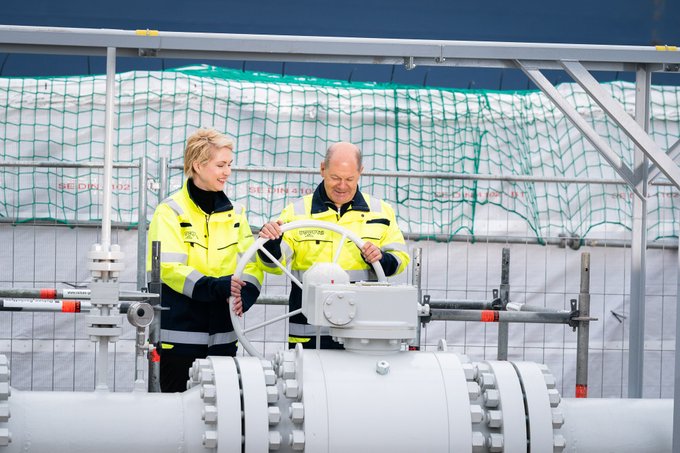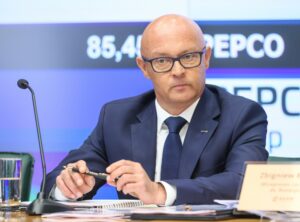Berlin may reorient its energy policy vis-a-vis Moscow. It will be a quick geopolitical move, which no politician in Europe wants to talk about, because it is simply about returning to Russian natural gas. It should be remembered that it was Vladimir Putin himself who cut off most of the gas export to EU countries (with the exception of Hungary), hoping that this would weaken the support of the European Union for Ukraine. Perhaps he was somewhat successful in it. The pro-Russian option is almost ready for reorientation. It would like to see a quick end to the war – writes Teresa Wójcik, editor at BiznesAlert.pl.
Before Putin invaded Ukraine, cheap Russian gas accounted for more than half of the supplies of this raw material to Germany, and to the entire European Union – more than a third. The Germans were extremely dependent on Russian fossil fuels, and what may seem strange – they found it very beneficial. They invested a lot of money in the transmission infrastructure for Russian gas. The truth was simple, this gas allowed Germany to continue to implement Energiewende and claim that the German energy transition was successful. The import made it possible for various energy-intensive industries and aluminium, steel, fertilizer and ceramics factories in Germany to function. Thus, it allowed Germany to avoid deindustrialization. To put it simply, the German economy was built on cheap energy. Today, such cheap energy remains in the realm of dreams.
However, German politicians do not want to dream, the pro-Russian circle is increasingly more vocal about reinstating large gas supplies from Russia. The „Russian solution” is pursued especially by Klaus Ernst who is the chairman of the Climate Commission of the German Bundestag and the representative of the Left party. He is known for statements in line with the Kremlin propaganda. He believes that reviving the energy partnership will be very profitable for both Germany and Russia after the end of the war in Ukraine. „At present, Germany finds itself in a completely different, competitive disadvantage compared to the United States. There, domestic energy prices are much, much lower. We find ourselves in economically unfavorable circumstances, the US is a dangerous economic competitor for us. With Russia, we complement each other economically, we do not compete,” he said. Therefore, Ernst argues, it makes a lot of sense to return to a rational partnership with Russia in the energy sphere.
This position is fully shared by Günter Verheugen, an influential SPD politician. Verheugen is former European Commissioner for Industry and Entrepreneurship, recognized in Germany even today as a great authority. In an interview (early January 2024) for the Bremen newspaper Weser-Kurier, he said ” I am analyzing the process of reducing international tensions in the 1980s. If you look at it without prejudice, the success of this process now makes a huge impression. If Willy Brandt had decided that it was not worth talking to Brezhnev about gas, the Cold War would not have ended at all. If change is necessary in an authoritarian state, it cannot be achieved by increasing military pressure. This can only be achieved by building relationships of mutual trust and common interests. This is how democratic Germany now has to deal with authoritarian Russia,” Verheugen said.
These two politicians are no exception.
Another supporter of returning to the energy alliance with Russia is the conservative CDU’s Michael Kretschmer, member of the Bundestag, vice-chairman of the CDU and Prime Minister of Saxony. He is also known for staying in tune with the Kremlin’s talking points despite the invasion of Ukraine. He has been calling on the German government to repair the damage to Nord Stream 1 Nord Stream 2 before the pipes are damaged by seawater. The Prime Minister of Saxony is convinced that the maintenance and renovation of both Nord Stream gas pipelines is in line with the national interests of Germany. In his view, „after the stupid war of Moscow and Kyiv,” provoked by the Americans, it is necessary to start using the perfectly developed infrastructure and transmission networks. This will make it possible to import more than 100 billion cubic meters of gas annually. This will save the German economy and will allow to develop trade in Russian gas in Europe. Kretschmer called for immediate diplomatic talks with Russia and questioned the need for too harsh sanctions against Moscow.
The list of German politicians who share the views of these three includes dozens of high-ranking officials in German political life. In the end, it is necessary to face the truth – Russian gas is still present on the German market and accounts for as much as 19.5 percent. It arrives to Germany as liquefied gas, bought from the Russian Novatek via international trading companies. It is delivered to Spanish and French LNG import terminals for German companies on the basis of spot contracts. It may be cheaper than LNG from Qatar and Norway delivered to the five German floating terminals. However, it is unclear whether the pro-Russian option in Germany will win the debate on the future of relations.









